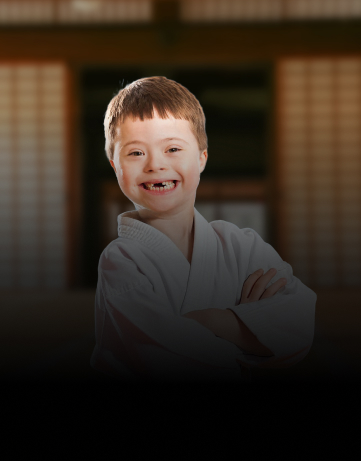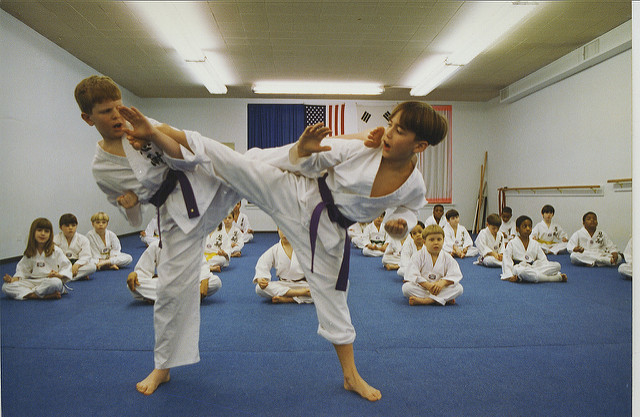Karate for kids – Empower Your Child Through Respected Martial Arts
Wiki Article
How Karate for Children Can Increase Confidence and Self-control in Youthful Martial Artists
Karate for children offers a special possibility to construct self-confidence and discipline in young martial musicians. As they learn brand-new strategies and face difficulties, they not just gain abilities yet likewise establish a solid sense of self-worth. This structured setting encourages them to value the journey of improvement. Exactly how does this training equate into their day-to-day lives? Discover the deeper links that make karate even more than simply a sport.The Significance of Confidence in Childhood Years Advancement
Self-confidence is an important structure block in childhood growth. When you nurture your youngster's self-confidence, you encourage them to face difficulties, take risks, and reveal themselves easily. Kids with self-confidence are much more willing to explore social scenarios and brand-new activities, which can bring about lasting friendships and useful experiences.Encouraging your kid to step out of their comfort zone cultivates durability. They learn that failing isn't the end but instead a tipping rock to success. By celebrating their accomplishments, regardless of just how small, you aid them acknowledge their abilities and worth.In this trip, support and favorable reinforcement from you play a crucial duty. Whether it's via appreciation or just existing, your involvement improves their confidence. As they grow, this confidence becomes a lifelong property, furnishing them to browse both obstacles and possibilities with a strong sense of self.How Martial Arts Shows Self-control and Focus
Martial arts aids you construct discipline and emphasis through its organized training program. As you exercise mindfulness during each session, you'll learn to concentrate far better both on and off the mat. And also, establishing and accomplishing objectives in martial arts enhances your ability to stay attentive and dedicated.Structured Training Routine
While you take part in karate training, you'll promptly uncover just how a structured program imparts self-control and emphasis in young professionals. Each course complies with a specific format, consisting of workouts, method practice, and sparring. This uniformity instructs you to respect the procedure and dedicate to enhancement. As you learn forms and techniques, you establish a sense of responsibility for your very own progress.The structured setting urges you to establish objectives, whether understanding a brand-new belt or developing a kata. You'll find that remaining focused during drills and courses hones your concentration. The self-control you cultivate in karate expands beyond the dojo, positively influencing your schoolwork and everyday routines. Each session enhances the value of devotion, aiding you become an extra self-displined individual.Mindfulness in Method
As you exercise martial arts, you'll locate that mindfulness comes to be an essential component of your training. Each action requires your complete interest, helping you remain concentrated on the existing moment. You'll discover to ignore diversions and focus on your breathing, movements, and intents. This heightened recognition hones your reflexes and enhances your discipline.During sparring or kinds, you'll find the importance of being emotionally present - Karate Salisbury MD. You'll discover exactly how this focus not just boosts your method but also develops your self-confidence. By practicing mindfulness in karate, you cultivate persistence and strength, crucial attributes that prolong past the dojo. In this method, karate instructs you to harness your mind, helping you develop a regimented strategy to obstacles both on and off the mat
Objective Setting Techniques
Establishing goals in martial arts isn't just regarding earning belts; it's a powerful means to grow self-control and emphasis. When you set details, achievable targets, you develop a roadmap for your progress. For circumstances, rather of just aiming to boost your kicks, try concentrating on understanding a particular method every month. This strategy maintains you motivated and engaged.Breaking down bigger objectives into smaller sized, convenient actions aids you track your progression and commemorate little triumphes along the road. Whether it's developing your stance or raising your sparring endurance, every objective enhances your commitment. As you attain these objectives, you'll develop confidence in your abilities and establish a strong feeling of technique that extends past the dojo right into daily life.Structure Resilience Through Martial Arts
Fighting style, particularly karate, supplies children a special chance to construct resilience in an encouraging setting. In classes, they encounter challenges that press their limits, whether it's competing or understanding a brand-new technique with a partner. Each obstacle, like a missed out on kick or a shed suit, becomes a chance to discover and grow.As they practice, children find out to embrace pain and keep trying, even when things obtain hard. They uncover that failure isn't the end; it becomes part of the trip. This mindset helps them get better stronger, not just in the dojo, however in daily life.With each obstacle they overcome, your kid develops self-confidence in their capability to deal with challenges, fueling their decision. Through karate, they'll understand that resilience isn't almost physical toughness; it's about mental grit and willpower, equipping them to encounter whatever life tosses their way.The Role of Respect in Karate Educating
Respect is a fundamental concept in karate training, fostering a culture of technique and sociability amongst get more info students. When you tip onto the dojo flooring, you're not simply finding out strategies; you're also finding out to respect your instructors, peers, and the art itself (Karate Salisbury MD). Bowing at the start and end of class isn't just a formality; it represents your recommendation of others' efforts and dedication.As you create mutual regard, you'll locate it enhances your understanding experience. You'll listen much more diligently to your teacher and gain insights from fellow trainees. This setting urges constructive criticism and assistance, allowing everybody to expand together.Moreover, respect cultivates self-control. Recognizing the worth of effort and humility assists you stay concentrated on your training. In turn, this regard translates right into your everyday life, improving your interactions and connections outside the dojo. Via karate, you find out that respect is essential for individual development and community buildingEstablishing Goals and Achieving Success in Karate

Social Abilities and Team Effort in the Dojo
While training in the dojo, children naturally create essential social abilities and synergy capabilities. As they exercise together with peers, they discover to connect properly, share space, and assistance each other. Each class provides opportunities for partnership, whether it's throughout partner drills or team workouts. This teamwork fosters friendships and develops a feeling of belonging, making the dojo a nurturing environment.Kids likewise gain useful dispute resolution skills. When they come across obstacles, such as disagreements during sparring, they learn to navigate these situations constructively. They practice patience and compassion, recognizing that every person has various staminas and weaknesses.Moreover, taking part in team activities cultivates a sense of liability. You'll see your youngster finding out to rely upon teammates and take responsibility for their role in a team. These experiences not just boost their fighting styles journey however likewise furnish them with social tools they'll bring into other areas of life.
The Long-Term Perks of Martial Arts Beyond Childhood
As youngsters expand up and shift into the adult years, the benefits of karate prolong far beyond the dojo. You'll locate that the technique and focus discovered with martial arts can convert right into your expert and scholastic life. Establishing and attaining goals in martial arts cultivates a solid work principles, which can push you to succeed in any kind of endeavor.Moreover, the confidence got from understanding strategies and sparring can improve your self-confidence, helping you tackle challenges head-on. This durability comes to be important as you encounter the uncertainties of adulthood.Additionally, the social skills established via teamwork and camaraderie in the dojo can result in far better relationships in both specialist and personal rounds. You'll discover to communicate properly, willpower conflicts, and build an encouraging network.Ultimately, karate shapes not just skilled martial artists, however all-round people ready to handle the world.Often Asked Inquiries
What Age Is Ideal to Beginning Martial Arts for Kids?
You can begin karate as early as age 4 or 5, yet it often relies on your kid's maturity and rate of interest. Finding a course that suits their age and power degree makes a big difference.Are There Any Health Advantages From Exercising Karate?
Yes, exercising karate offers numerous health and wellness benefits. You'll boost your adaptability, strength, and control while boosting cardiovascular fitness. And also, it boosts focus and mental health, making it an amazing choice for overall physical and psychological health.Exactly How Often Should Youngsters Participate In Martial Arts Classes?
You ought to urge your kids to attend karate courses at the very least a couple of times a week. Uniformity helps them find out techniques successfully and develop abilities, making their experience more rewarding and enjoyable in the lengthy run.Can Karate Aid With Managing Anxiousness in Children?
Yes, martial arts can assist manage anxiousness in kids. It educates emphasis and self-discipline while offering a secure outlet for energy. You'll see your child growing extra positive and tranquil as they practice consistently.What Gear Is Needed for Kids Starting Martial Arts?

Report this wiki page